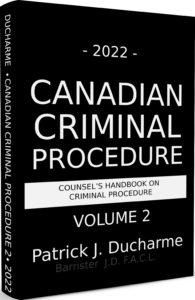 |
| Patrick Ducharme |
The Supreme Court of Canada in Carter1 provided the method by which evidence would be admissible under the co-conspirators’ exception and McIntyre J. five years later succinctly summarized the procedure under Carter as a three-step process:
i. The trier of fact must first be satisfied, beyond a reasonable doubt, that the alleged conspiracy in fact existed;
ii. If the alleged conspiracy is found to exist, then the trier of fact must review all the evidence that is directly admissible against the accused and decide, on a balance of probabilities, whether or not he is a member of the conspiracy;
iii. If the trier of fact concludes, on a balance of probabilities, that the accused is a member of the conspiracy, then the trier of fact must go on and decide whether the Crown has established such membership beyond a reasonable doubt. In this last step only, the trier of fact can apply the hearsay exception and consider evidence of acts and declarations of co-conspirators, done in furtherance of the object of the conspiracy, as evidence against the accused on the issue of his guilt.
Continue reading “The Supreme Court of Canada on the Co-Conspirator Exception to the Hearsay Rule”



